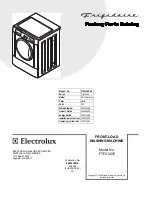
Loading the dishwasher
27
Items not recommended for dish‐
washing
– Wooden cutlery, cutting boards and
dishware or items with wooden parts
– Craft items, antiques, valuable vases,
and decorative glassware
– Plastic items which are not heat-re‐
sistant: the high temperatures in the
dishwasher may cause them to melt
or lose shape.
– Copper, brass, tin and aluminum
items may discolor or become matt.
– Colors painted over a glaze may fade
after a number of washes.
– Delicate glassware and glassware
containing lead crystal: clouding may
occur over time.
Please note:
Silverware
previously cleaned with a
silver polish
may still be damp or spot‐
ted at the end of a program, where wa‐
ter has not run off smoothly. It may
need to be rubbed dry with a soft cloth.
Silver which has been in contact with
foods containing sulphur can discolor.
These include egg yolk, onions, mayon‐
naise, mustard, fish, and marinades.
ɘ
Aluminum components (e.g.,
range hood grease filters) must not
be cleaned with a commercial or in‐
dustrial cleaning agent.
These may damage the material.
Tip:
When purchasing new dishware
and cutlery, make sure they are dish‐
washer-safe.
Glass care
– Clouding may occur on glasses after
frequent washing. If delicate glass‐
ware is washed in the dishwasher,
ensure that only very low tempera‐
tures are used (see program chart), or
a special glass-care program is used
(depending on model). This will re‐
duce the risk of clouding.
– Purchase glassware which is dish‐
washer-safe (e.g., Riedel glassware).
– Use detergents with glass protective
additives (e.g., Miele CareCollection
tabs).
– Visit "http://www.mieleglass‐
care.com/international/en/glasscare/
english" for more information on
glass care.
















































